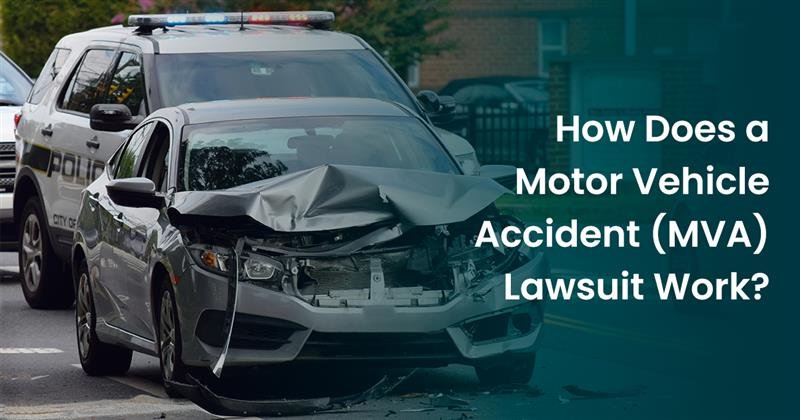Motor vehicle accidents are an unfortunate reality on U.S. roads, with millions of crashes happening each year. In 2020 alone, there were over 8.5 million car and light truck accidents in the U.S., resulting in nearly 39,000 deaths and over 2.2 million injuries. These numbers highlight just how common – and serious – MVAs can be.
If you or a loved one has been involved in a motor vehicle accident and are considering legal action, understanding how an MVA lawsuit works can help you protect your rights and make informed decisions.
What Is a Motor Vehicle Accident (MVA) Lawsuit?
An MVA lawsuit is a legal claim filed by an accident victim (plaintiff) against one or more at-fault parties (defendants) who contributed to the accident. The goal is to recover compensation for injuries, property damage, lost wages, and emotional suffering caused by the crash.
Whether you’re dealing with a rear-end collision, multi-car pile-up, or pedestrian-related crash, the legal process for filing an MVA claim follows a structured path.
No-Fault Insurance and When You Can Sue
Some states, like Florida, use a no-fault insurance system. This means your own insurance company pays for your basic medical bills and certain economic losses, regardless of who caused the accident. This is covered under Personal Injury Protection (PIP) insurance.
However, if your injuries are considered serious (such as permanent disfigurement, loss of a bodily function, or significant scarring), you may step outside the no-fault system and file a lawsuit against the at-fault driver.
Statute of Limitations
Every state has a deadline, or statute of limitations, for filing a lawsuit after an accident. In many states, this is 2 to 4 years from the date of the crash.
Failing to file within the deadline may result in losing your right to compensation – no matter how strong your case is. That’s why it’s crucial to act early and consult with an MVA attorney as soon as possible.
Understanding Fault: The Modified Comparative Negligence Rule
In MVA lawsuits, proving fault is essential. Most states use a modified comparative negligence rule, which allows multiple parties to share responsibility for a crash.
Let’s say you were injured in an accident, but were found to be 20% at fault for the crash. If your total damages were $100,000, you would still be eligible to recover $80,000, reflecting your level of responsibility.
If your share of the blame exceeds 50% in some states, you may be barred from recovering any damages.
When Are You Legally Required to Report an MVA?
You must report a motor vehicle accident to law enforcement if:
- Someone is injured or killed
- Property damage exceeds a set threshold (often $500 or more)
- A vehicle is not drivable
Even in minor accidents, it’s wise to file a police report. It creates an official record that can support your claim during the lawsuit process.
Damages You Can Recover in an MVA Lawsuit
The purpose of an MVA lawsuit is to recover damages – the financial compensation awarded to you for your losses.
1. Economic Damages
These include measurable losses such as:
- Medical expenses
- Physical therapy and rehab
- Lost wages
- Vehicle repair or replacement
- Transportation to medical appointments
- Funeral or burial costs (in wrongful death cases)
2. Non-Economic Damages
These are harder to quantify but just as impactful:
- Pain and suffering
- Anxiety or depression
- PTSD
- Loss of companionship or enjoyment of life
- Emotional distress
3. Punitive Damages
In rare and extreme cases (e.g., a drunk driver or someone drag racing), courts may award punitive damages to punish the wrongdoer and prevent future misconduct.
Proving Negligence in an MVA Lawsuit
To win an MVA lawsuit, your attorney must prove negligence – that the other driver failed to exercise reasonable care.
Common examples of negligent behaviour:
- Speeding or aggressive driving
- Running a red light or stop sign
- Distracted driving (e.g., texting)
- Driving under the influence of alcohol or drugs
Your legal team will gather:
- Police reports
- Eyewitness statements
- Dashcam or surveillance footage
- Medical records
- Expert testimony
This evidence will be critical in building a strong case.
The MVA Lawsuit Process Step-by-Step
1. Filing the Complaint
The legal process begins with your attorney filing a complaint in civil court. This outlines the facts of the case, the injuries sustained, and the compensation being sought.
2. Serving the Defendant
The defendant (or their insurance company) is notified of the lawsuit. They’ll have a set amount of time to respond.
3. Discovery
Both sides exchange evidence and interview witnesses. This phase can last several months to a year, depending on how complex the case is.
4. Negotiation and Settlement Talks
Many MVA cases are settled out of court during this phase. If both parties agree on a fair amount, the case is resolved without a trial.
5. Trial (If needed)
If a settlement isn’t reached, the case will go to trial, where a judge or jury decides the outcome. Trials can take time but may be necessary for maximum compensation.
Timeline for Resolution
The average MVA lawsuit can take anywhere from a few months to over a year. Factors that influence the timeline include:
- Complexity of the case
- Severity of injuries
- Number of parties involved
- Willingness of the insurance company to settle
Your attorney will guide you through each phase and work to avoid unnecessary delays.
Why You Should Hire a Motor Vehicle Accident Lawyer
MVA lawsuits involve complex legal procedures, tight deadlines, and negotiations with insurance adjusters who are not on your side. An experienced MVA attorney will:
- Investigate the crash thoroughly
- Gather and preserve evidence
- Calculate the full extent of your damages
- Negotiate with insurance companies
- Represent you in court if needed
With legal representation, you can focus on your recovery while your attorney focuses on getting you the compensation you deserve.
Final Thoughts: Don’t Wait to Get Legal Help
A motor vehicle accident can leave you with injuries, emotional trauma, and financial strain. Understanding how an MVA lawsuit works empowers you to make informed decisions about your future.
Whether your accident was minor or catastrophic, a skilled MVA lawyer can help protect your rights and pursue the compensation you deserve.
Need Legal Guidance After an MVA?
We handle the legal process so you can focus on healing. Contact us today for a free consultation and find out how we can help you get the justice you deserve.


